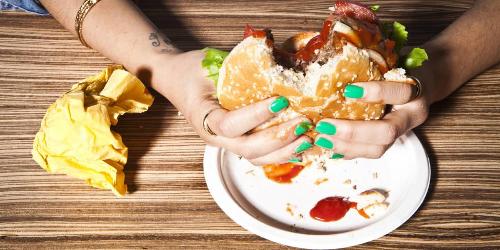Signs You're Not Eating Enough Fat
By Cosmopolitan | Yahoo Health
Photo: Getty + Dean Belcher
By Elizabeth Narins
The whole fat-free diet craze of the 1990s really messed up the way people think about healthy eating. But the truth is, the kind of fat you eat isn’t the same kind that makes your pants feel tight — and your body absolutely needs the delicious kind of fat to function properly.
While your activity level, age, and current health status determine exactly how much fat you should eat, the government’s daily allowance for most women is the equivalent of five or six teaspoons of oil from food sources like avocado, peanut butter, nuts, seeds, margarine, mayo, and salad dressing.
(See how many teaspoons of oil are in each of these foods here.)
(See how many teaspoons of oil are in each of these foods here.)
If you’re not into counting and measuring, consider these signs to gauge whether you’re getting enough fat:
1. You’re starving. Or at least it feels that way — even after you ate a seemingly sizable meal. Because your body takes a longer time to processes fat than it does to digest carbs, meals that include fat help keep you feeling full for longer, says Anne Mauney, a registered dietitian based in Washington D.C.
2. Your skin has seen better days. If it’s especially dry, flaky, dull, or it looks older than you are, lack of dietary fat could be the culprit, says Lori Welstead, M.S., a registered dietitian at the University of Chicago Medicine in Chicago, Illinois. While you might have heard that greasy food messes with your skin, healthy fats help you absorb the fat-soluble vitamins in other foods you eat that help your skin maintain moisture. So without, say, dressing on your salad, your body can only utilize so much of the other nutrients you eat. Your skin could bear the brunt of it.
3. Your period is MIA. Your body uses dietary fat to regulate your hormones, so skimping on it can mess with your cycle, Welstead says. (Note: Diet isn’t the only thing that can make your period disappear. If things feel out of whack, check in with your gyno before you self-diagnose.)
4. You seriously can’t focus. One gram of fat contains twice as many calories as one gram of carbs or protein. (It’s why fatty foods generally contain more calories than protein or carbs.) While it’s totally possible to consume enough calories from carbs and protein alone, people who are super careful about avoiding foods with fat could unintentionally under-eat. And who can think about anything but food on an empty stomach?
5. You’re extra anxious and maybe even a little depressed. While there could be other factors at play here, Welstead says skimping on essential fatty acids like omega-3 and omega-6 can make you feel blah. Fish, flax seeds, and chia seeds are good food sources. If anxiety comes out of nowhere, or you can’t knock your bad moods, try eating two weekly servings of fatty fish such as salmon, fresh tuna, or sardines, if you’re into that sort of thing, and see if things improve.
6. You suffer from sensory overload at crowded bars and malls. In a 2009 study conducted by the American Psychological Association, researchers fed mice different amounts of omega-3 fatty acids and exposed the animals to a soft tone, then a loud one. (The soft one is meant to prep the mice so they expect the second sound. If all goes according to plan, they flinch less when they hear the louder noise.) Mice who ate sufficient amounts of omega-3 kept their cool throughout the tests, while deficient mice sort of freaked out. Researchers say that omega-3 deficiency could reduce your ability to handle sensory input.
7. You’re fit, but you basically collapse after 20 minutes of exercise. If you exercise regularly and lose steam more quickly than usual, your diet could be one of the reasons why. During exercise, your body burns carbs from food first, then relies on calories from fat to keep you going, according to Medline Plus, which could leave fat-free dieters SOL.
8. You remember nothing. Large-scale studies on older populations suggest that high-fat diets that contain olive oil, nuts, fish, and other classic Mediterranean foods can help preserve memory. If you’re pretty much losing it now and you don’t eat much fat, connect the dots, and start eating up.
More from Cosmopolitan.com:








No comments :
Post a Comment